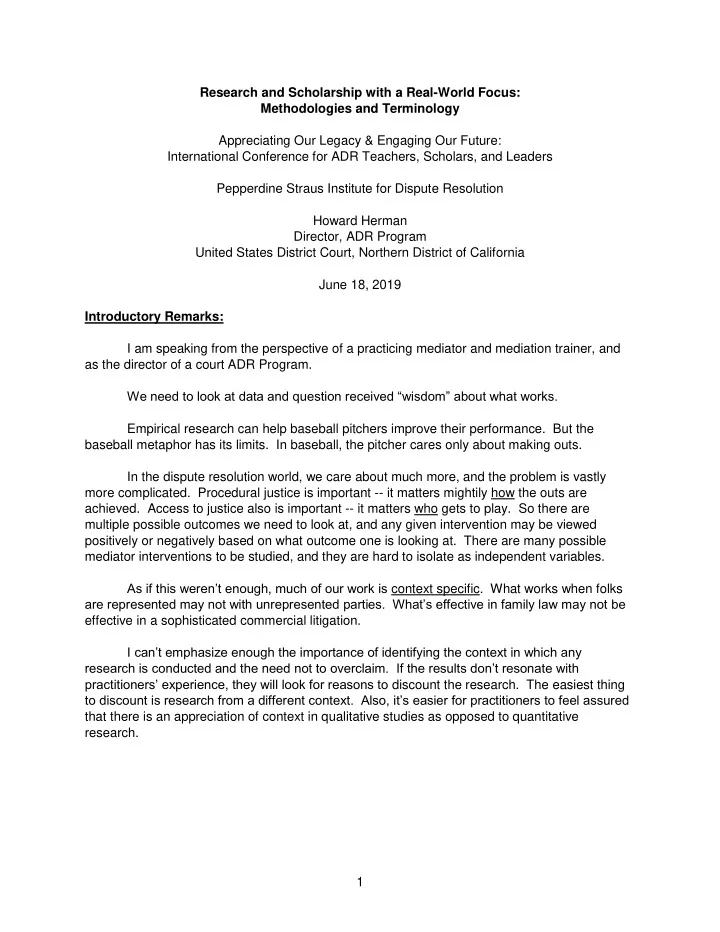

Research and Scholarship with a Real-World Focus: Methodologies and Terminology Appreciating Our Legacy & Engaging Our Future: International Conference for ADR Teachers, Scholars, and Leaders Pepperdine Straus Institute for Dispute Resolution Howard Herman Director, ADR Program United States District Court, Northern District of California June 18, 2019 Introductory Remarks: I am speaking from the perspective of a practicing mediator and mediation trainer, and as the director of a court ADR Program. We need to look at data and question received “wisdom” about what works. Empirical research can help baseball pitchers improve their performance. But the baseball metaphor has its limits. In baseball, the pitcher cares only about making outs. In the dispute resolution world, we care about much more, and the problem is vastly more complicated. Procedural justice is important -- it matters mightily how the outs are achieved. Access to justice also is important -- it matters who gets to play. So there are multiple possible outcomes we need to look at, and any given intervention may be viewed positively or negatively based on what outcome one is looking at. There are many possible mediator interventions to be studied, and they are hard to isolate as independent variables. As if this weren’t enough, much of our work is context specific. What works when folks are represented may not with unrepresented parties. What’s effective in family law may not be effective in a sophisticated commercial litigation. I can’t emphasize enough the importance of identifying the context in which any research is conducted and the need not to overclaim. If the results don’t resonate with practitioners’ experience, they will look for reasons to discount the research. The easiest thing to discount is research from a different context. Also, it’s easier for practitioners to feel assured that there is an appreciation of context in qualitative studies as opposed to quantitative research. 1
Empirical Research With a Real-World Focus: Lack of Clarity of Terminology Terms need to be clear, match the real world, and not used at too high a level of generality. We especially should avoid the false evaluative / facilitative dichotomy which leads to over-simplification of the actual interventions. Terminology should focus on specific interventions and behaviors. Look at groupings in Task Force Report on Mediation Research. Of the seven intervention categories identified in the report, four are very helpful and practical: ! Offering suggestions/opinions ! Eliciting disputant suggestions ! Pre-Mediation caucus ! Use of caucus The other three categories are much more problematic: “Pressing / directive” interventions are defined very differently in differ ent studies, ! including things that are not alike such as: “noting costs of non - agreement” ! “threatening to terminate mediation” ! “analyzing strengths and weaknesses” ! “pressing and pushing hard” ! “Addressing emotions” is overly general and includes thi ngs like ! “everyone expresses feelings” ! “control hostility” ! “Build rapport and trust, empathy, structuring agenda, and other process -oriented ! styles” includes too many disparate interventions lumped together to provide for meaningful results. Looking at Outcomes The Task Force Report also looked at three categories of outcomes: ! Effect on settlement ! Effect on disputant perceptions ! Effect on attorney perceptions 2
The last two categories are in some sense proxies for or related to measures of procedural justice. The Task Force did not consider other outcomes: Access to Justice – the “who gets to play“ question. Th is may be less about the ! nature of mediator interventions. Research might compare represented vs. self- represented parties in mediation. Substantive Justice – are the mediated results actually just? Research might ! compare mediated settlements with adjudicated settlements. Where Additional Research Might Help Us in the Field ! Mediator Interventions: ! Joint sessions ! Substantive ! Procedure ! None ! Pre-work / convening ! Pre-session calls ! In person ! Lawyers only ! Lawyers and clients ! Mini caucus pre-session Mediator’s opening statements etc. ! What’s helpful to say, leave out ! Other “priming” activities ! ! Use of Legal Analysis ! Styles of discussion of BATNA ! Consideration of strengths and weaknesses of the legal case ! Use of Caucus ! Time spent ! Nature of empathy and establishing connection ! Use of Mediator Proposals 3
! Other matters worth studying: ! Participant perceptions about the mediator including background, and diversity match. (The recent Maryland study included a comment about the possibility of increased settlement and increased participant satisfaction when race of mediator matches the participants. This is a contr oversial area but we shouldn’t shrink from looking at this). ! Repeat Players ! Effect of Unbundling ! Technology – use of participation by phone, skype, zoom 4
Recommend
More recommend